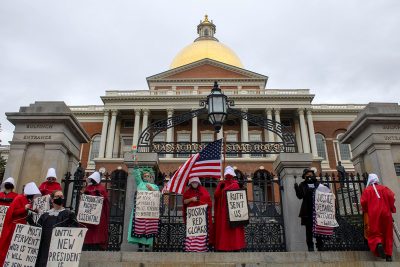Demonstrators clad in red cloaks and white bonnets gathered on the steps of the Massachusetts State House Sunday morning to advocate for abortion rights and condemn Amy Coney Barrett’s confirmation to the U.S. Supreme Court.

Speakers called for the swift passage of the Act to Remove Obstacles and Expand Abortion Access, or ROE Act, in Massachusetts. Behind them stood a wall of women dressed as Supreme Court justices, Lady Liberty and — most prominently — handmaids from Margaret Atwood’s dystopian novel and series “The Handmaid’s Tale.”
The demonstration, organized by the Boston Red Cloaks, was part of a national day of protest against Barrett’s confirmation following the death of Justice Ruth Bader Ginsburg, which many view as a sign of the looming erosion of landmark abortion case Roe v. Wade.
The protest began shortly after 10 a.m. with a procession of handmaids from the Boston Public Garden to the State House. Walking silently, they carried flags and signs reading “Ruth sent us” and “Don’t confirm before the next term” suspended from wire coat hangers.
At the State House, an audience of about 60 people gathered for speeches by pro-choice activists and state officials.
“The threats to our reproductive health care and reproductive rights are real,” said Massachusetts Rep. Tami Gouveia, who co-sponsored the bill in early 2019. “They are imminent. They are on our doorstep, just like we are standing here on the doorstep of the State House to say, ‘Now is the time to pass the ROE Act.’”
The ROE act would prohibit the state from interfering in or preventing “medically appropriate methods of abortion” and provide the term with a new legal definition. In June of 2019, the bill was passed to the State Judiciary Committee, where it has since remained in legislative limbo.
Gouveia told The Daily Free Press that progress has been further stalled by the ongoing pandemic. Despite the delay, she said she is hopeful the act can set a national example, especially if the Supreme Court case is overturned.
“If we pass the ROE Act in Massachusetts,” Gouveia said, “we will be sending the message that we see that women’s reproductive health care and their rights to manage their own bodies is of paramount.”
Other speakers cited Barrett’s historically anti-abortion stance, arguing her confimation would likely lead to the elimination of Roe v. Wade and the undermining of abortion rights nationally.
Carrie Baker, president of the Abortion Rights Fund of Western Massachusetts, said 22 states would likely outlaw abortion if Roe were overturned.
If that were to happen, she said, her organization anticipates that Massachusetts would become a “destination on a underground abortion railroad.”
Throughout the demonstration, the Red Cloaks caught the attention of Beacon Street drivers and tourists.
Expletives, car horns and cries of “Trump 2020” rang from the street, but few who appeared to oppose the protest slowed down to engage with attendees. Others honked and cheered, occasionally holding up traffic to watch the speakers.
One duck boat driver paused their guided tour, allowing riders to take photographs and videos of the protestors. From another bus, a woman shouted “Praise be” — a statement of gratitude common in the “Handmaid’s Tale” universe.
Sunday’s demonstration also drew a number of first-time handmaids, including Boston University School of Medicine student Bridgette Merriman, who said she first heard about the Red Cloaks at a meeting for the BU Medical Students for Choice.
“I’ve known that people were protesting in this way, and I thought the visual was so powerful,” Merriman said. “The way that it almost just fell into my lap seemed too good to be true. I felt like I was just pulled toward the movement in that way.”
Merriman added that dystopian societies such as Atwood’s do not form overnight, but are the result of a country “slowly chipping away” at women’s rights, making political action necessary.
The demonstration at the State House closed with a nearly 10-minute moment of silence. Afterward, protesters made their way to the Public Garden’s footbridge for a final photo session, continuing to attract the attention of park-goers.
Jessie Steigerwald, a founding member of the Red Cloaks, said the group has used imagery of the handmaids since 2018 to broadly symbolize the mistreatment of women in the United States.
Steigarwald added that, though many protestors employ the uniform alone, the Red Cloaks add signs as a way of turning the symbol of oppression into one of empowerment.
“You might have someone walk up who’s been a victim of sexual assault. You might have someone who’s had an abortion. You might have someone walk up who’s simply been fighting for equal pay,” Steigerwald said before Sunday’s demonstration. “Just seeing the outfit … suddenly they feel understood. They feel seen. They feel heard.”




















































































































Corinne • Oct 26, 2020 at 12:33 pm
Excellent writing, accurate and well rounded explanation of the current protests and their place within the context of the larger arena of American politics.
Debra allerhand • Oct 26, 2020 at 7:59 am
Wonderful article – I’m proud of the content and the autboe